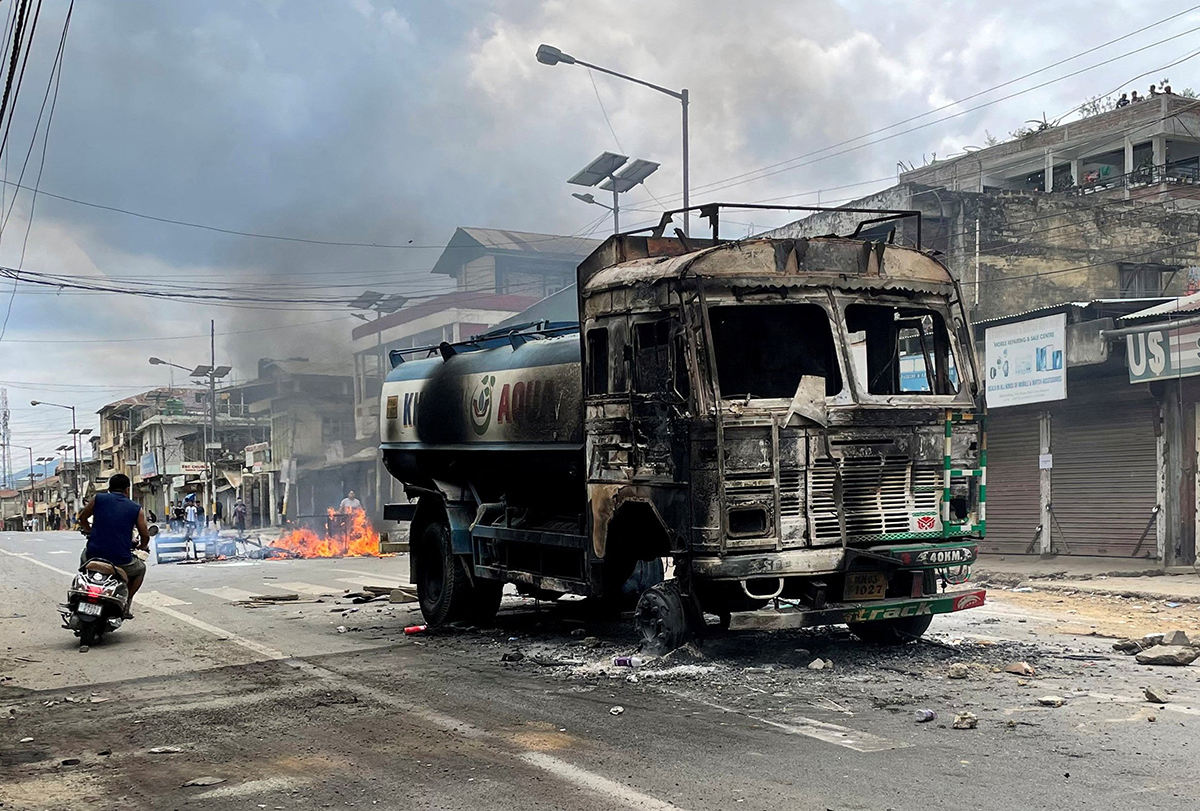ROME (OSV News) — Divisive ideologies and agendas are the root cause of an ethnic conflict that has led to violence against Christians and attacks on churches in India’s northeastern state of Manipur, said Indian Archbishop Dominic Lumon of Imphal, the state’s capital city.
“Hidden agendas and ideologies contrary to the constitutional and democratic values often infiltrate into the region and the state which jeopardizes the peaceful coexistence and religious harmony of the state and the region,” Archbishop Lumon told OSV News May 24.
“Outside forces with the hidden agendas to disturb communal harmony and vested interests have to be recognized and resisted,” he said.
Violence began in early May when ethnic tribal groups, primarily Christian, protested against a High Court decision granting “Scheduled Tribe” status to the majority Meithei Hindu community.
Scheduled Tribes are Indigenous tribal groups that are given reservation status under India’s constitution. Traditionally disadvantaged communities recognized as Scheduled Tribes are guaranteed political representation, and receive benefits such as education and employment.
Answering questions from OSV News via email, Archbishop Lumon explained that opposition to the Meithei community’s inclusion in the list of Scheduled Tribes also would grant them the right to own land in ethnic tribal areas and is an issue that is at “heart of the violence in Manipur.”
He also cited disparity in land distribution and in political representation in favor of the Meithei community as reasons for escalating tensions in the region. According to UCA News, recent riots claimed the lives of over 70 people and left tens of thousands of people displaced.
Anger toward tribal Christians and their opposition toward the Meithei’s granting of reservation status have led to attacks on homes and Christian places of worship, the archbishop said.
Houses belonging to Christians “are burned, vandalized and looted. They have lost their land, houses, belongings, employment opportunities and the education of their children. It is rather difficult to quantify the total damage and losses,” Archbishop Lumon told OSV News.
He also said that as of now, an estimated 260 churches “have been gutted down,” including six Catholic churches and one pastoral training center.
“The loss for the Catholic Church has been calculated to the tune of 150 million Rupees ($1.8 million)” and “the government has not given any assurance that they would compensate for the losses,” the archbishop said.
“This unprecedented social current has personally affected me and the archdiocese. Many of my church personnel have undergone traumatic experiences during the mob violence,” he added.
Nevertheless, Archbishop Lumon lamented the loss of both Christian and Hindu lives in the conflict and said that despite government-imposed curfews and and internet disruptions, the Archdiocese of Imphal is “trying its best to take stock of the situation and is rolling out a number of relief services to the suffering.”
“A number of philanthropic and social service organizations have been contacted for external help,” he said. “As we are cut off in many ways, the outward dissemination of information is carried out by the Regional Bishops’ Secretariat.”
He also said that for the time being, he has not requested assistance from the Vatican to aid Christians in the area.
Archbishop Lumon told OSV News that Manipur is a multiethnic state of many cultural and religious groups and that the only way it can move past the violence is if its people “learn to embrace a common brotherhood and peaceful coexistence.”
Furthermore, he added, “there should be equitable distribution of resources and the development initiatives to be taken up to address the prolonged deprivation and promote a common ‘belongingness.'”
“A sustained peace initiative has to be taken up involving various stakeholders,” Archbishop Lumon said.
Juno Arocho Esteves writes for OSV News from Rome.




